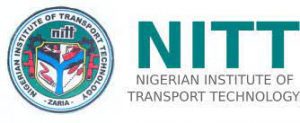The repeal and re-enactment of the Act establishing the Nigerian Institute of Transport Technology , ( NITT) has commenced in the House of Representatives.
The proposed law, according to Gbemisola Saraki, Minister of State for Transport, will reposition NITT as a leading national institution to achieve economic growth.

She added that it was the ministry’s goal to support it in reaching its full potential as a global standard institute.
The Nigerian Institute of Transport Technology was created in 1986 as the apex transport and logistics management development Institute across the West African sub region.
Its mandate is to build workforce capacity in order to make the transportation and logistics industry more effective and efficient.
The end goal is to stimulate economic growth and development.
Sixteen years after, the House is moving to repeal and re-enact a law that will guide the operations of the Institute.
The parliament said if properly harnessed, the Institute will liberate the country from over dependence on oil.
Speaker, Gbajabiamila stated that if the bill is passed, it will provide direct and indirect job opportunities as well as reduce traffic congestion on roads and waterways.
Chairman of the House of Reps Committee, Abbas Tarjudeen stated in his remarks that transportation is important in people’s daily lives.
Stakeholders are encouraged by the prospect of a new law that adheres to global best practices.
The Institute offers management training for personnel working in all modes of transportation. It also provides equipment and facilities for the support, promotion and conduct of applied reserach in all modes of transportation.
The repeal and re-enactment of the Act establishing the Nigerian Institute of Transport Technology , ( NITT) has commenced in the House of Representatives.
The proposed law, according to Gbemisola Saraki, Minister of State for Transport, will reposition NITT as a leading national institution to achieve economic growth.

She added that it was the ministry’s goal to support it in reaching its full potential as a global standard institute.
The Nigerian Institute of Transport Technology was created in 1986 as the apex transport and logistics management development Institute across the West African sub region.
Its mandate is to build workforce capacity in order to make the transportation and logistics industry more effective and efficient.
The end goal is to stimulate economic growth and development.
Sixteen years after, the House is moving to repeal and re-enact a law that will guide the operations of the Institute.
The parliament said if properly harnessed, the Institute will liberate the country from over dependence on oil.
Speaker, Gbajabiamila stated that if the bill is passed, it will provide direct and indirect job opportunities as well as reduce traffic congestion on roads and waterways.
Chairman of the House of Reps Committee, Abbas Tarjudeen stated in his remarks that transportation is important in people’s daily lives.
Stakeholders are encouraged by the prospect of a new law that adheres to global best practices.
The Institute offers management training for personnel working in all modes of transportation. It also provides equipment and facilities for the support, promotion and conduct of applied reserach in all modes of transportation.
The repeal and re-enactment of the Act establishing the Nigerian Institute of Transport Technology , ( NITT) has commenced in the House of Representatives.
The proposed law, according to Gbemisola Saraki, Minister of State for Transport, will reposition NITT as a leading national institution to achieve economic growth.

She added that it was the ministry’s goal to support it in reaching its full potential as a global standard institute.
The Nigerian Institute of Transport Technology was created in 1986 as the apex transport and logistics management development Institute across the West African sub region.
Its mandate is to build workforce capacity in order to make the transportation and logistics industry more effective and efficient.
The end goal is to stimulate economic growth and development.
Sixteen years after, the House is moving to repeal and re-enact a law that will guide the operations of the Institute.
The parliament said if properly harnessed, the Institute will liberate the country from over dependence on oil.
Speaker, Gbajabiamila stated that if the bill is passed, it will provide direct and indirect job opportunities as well as reduce traffic congestion on roads and waterways.
Chairman of the House of Reps Committee, Abbas Tarjudeen stated in his remarks that transportation is important in people’s daily lives.
Stakeholders are encouraged by the prospect of a new law that adheres to global best practices.
The Institute offers management training for personnel working in all modes of transportation. It also provides equipment and facilities for the support, promotion and conduct of applied reserach in all modes of transportation.
The repeal and re-enactment of the Act establishing the Nigerian Institute of Transport Technology , ( NITT) has commenced in the House of Representatives.
The proposed law, according to Gbemisola Saraki, Minister of State for Transport, will reposition NITT as a leading national institution to achieve economic growth.

She added that it was the ministry’s goal to support it in reaching its full potential as a global standard institute.
The Nigerian Institute of Transport Technology was created in 1986 as the apex transport and logistics management development Institute across the West African sub region.
Its mandate is to build workforce capacity in order to make the transportation and logistics industry more effective and efficient.
The end goal is to stimulate economic growth and development.
Sixteen years after, the House is moving to repeal and re-enact a law that will guide the operations of the Institute.
The parliament said if properly harnessed, the Institute will liberate the country from over dependence on oil.
Speaker, Gbajabiamila stated that if the bill is passed, it will provide direct and indirect job opportunities as well as reduce traffic congestion on roads and waterways.
Chairman of the House of Reps Committee, Abbas Tarjudeen stated in his remarks that transportation is important in people’s daily lives.
Stakeholders are encouraged by the prospect of a new law that adheres to global best practices.
The Institute offers management training for personnel working in all modes of transportation. It also provides equipment and facilities for the support, promotion and conduct of applied reserach in all modes of transportation.
The repeal and re-enactment of the Act establishing the Nigerian Institute of Transport Technology , ( NITT) has commenced in the House of Representatives.
The proposed law, according to Gbemisola Saraki, Minister of State for Transport, will reposition NITT as a leading national institution to achieve economic growth.

She added that it was the ministry’s goal to support it in reaching its full potential as a global standard institute.
The Nigerian Institute of Transport Technology was created in 1986 as the apex transport and logistics management development Institute across the West African sub region.
Its mandate is to build workforce capacity in order to make the transportation and logistics industry more effective and efficient.
The end goal is to stimulate economic growth and development.
Sixteen years after, the House is moving to repeal and re-enact a law that will guide the operations of the Institute.
The parliament said if properly harnessed, the Institute will liberate the country from over dependence on oil.
Speaker, Gbajabiamila stated that if the bill is passed, it will provide direct and indirect job opportunities as well as reduce traffic congestion on roads and waterways.
Chairman of the House of Reps Committee, Abbas Tarjudeen stated in his remarks that transportation is important in people’s daily lives.
Stakeholders are encouraged by the prospect of a new law that adheres to global best practices.
The Institute offers management training for personnel working in all modes of transportation. It also provides equipment and facilities for the support, promotion and conduct of applied reserach in all modes of transportation.
The repeal and re-enactment of the Act establishing the Nigerian Institute of Transport Technology , ( NITT) has commenced in the House of Representatives.
The proposed law, according to Gbemisola Saraki, Minister of State for Transport, will reposition NITT as a leading national institution to achieve economic growth.

She added that it was the ministry’s goal to support it in reaching its full potential as a global standard institute.
The Nigerian Institute of Transport Technology was created in 1986 as the apex transport and logistics management development Institute across the West African sub region.
Its mandate is to build workforce capacity in order to make the transportation and logistics industry more effective and efficient.
The end goal is to stimulate economic growth and development.
Sixteen years after, the House is moving to repeal and re-enact a law that will guide the operations of the Institute.
The parliament said if properly harnessed, the Institute will liberate the country from over dependence on oil.
Speaker, Gbajabiamila stated that if the bill is passed, it will provide direct and indirect job opportunities as well as reduce traffic congestion on roads and waterways.
Chairman of the House of Reps Committee, Abbas Tarjudeen stated in his remarks that transportation is important in people’s daily lives.
Stakeholders are encouraged by the prospect of a new law that adheres to global best practices.
The Institute offers management training for personnel working in all modes of transportation. It also provides equipment and facilities for the support, promotion and conduct of applied reserach in all modes of transportation.
The repeal and re-enactment of the Act establishing the Nigerian Institute of Transport Technology , ( NITT) has commenced in the House of Representatives.
The proposed law, according to Gbemisola Saraki, Minister of State for Transport, will reposition NITT as a leading national institution to achieve economic growth.

She added that it was the ministry’s goal to support it in reaching its full potential as a global standard institute.
The Nigerian Institute of Transport Technology was created in 1986 as the apex transport and logistics management development Institute across the West African sub region.
Its mandate is to build workforce capacity in order to make the transportation and logistics industry more effective and efficient.
The end goal is to stimulate economic growth and development.
Sixteen years after, the House is moving to repeal and re-enact a law that will guide the operations of the Institute.
The parliament said if properly harnessed, the Institute will liberate the country from over dependence on oil.
Speaker, Gbajabiamila stated that if the bill is passed, it will provide direct and indirect job opportunities as well as reduce traffic congestion on roads and waterways.
Chairman of the House of Reps Committee, Abbas Tarjudeen stated in his remarks that transportation is important in people’s daily lives.
Stakeholders are encouraged by the prospect of a new law that adheres to global best practices.
The Institute offers management training for personnel working in all modes of transportation. It also provides equipment and facilities for the support, promotion and conduct of applied reserach in all modes of transportation.
The repeal and re-enactment of the Act establishing the Nigerian Institute of Transport Technology , ( NITT) has commenced in the House of Representatives.
The proposed law, according to Gbemisola Saraki, Minister of State for Transport, will reposition NITT as a leading national institution to achieve economic growth.

She added that it was the ministry’s goal to support it in reaching its full potential as a global standard institute.
The Nigerian Institute of Transport Technology was created in 1986 as the apex transport and logistics management development Institute across the West African sub region.
Its mandate is to build workforce capacity in order to make the transportation and logistics industry more effective and efficient.
The end goal is to stimulate economic growth and development.
Sixteen years after, the House is moving to repeal and re-enact a law that will guide the operations of the Institute.
The parliament said if properly harnessed, the Institute will liberate the country from over dependence on oil.
Speaker, Gbajabiamila stated that if the bill is passed, it will provide direct and indirect job opportunities as well as reduce traffic congestion on roads and waterways.
Chairman of the House of Reps Committee, Abbas Tarjudeen stated in his remarks that transportation is important in people’s daily lives.
Stakeholders are encouraged by the prospect of a new law that adheres to global best practices.
The Institute offers management training for personnel working in all modes of transportation. It also provides equipment and facilities for the support, promotion and conduct of applied reserach in all modes of transportation.














